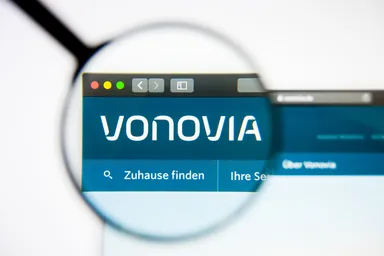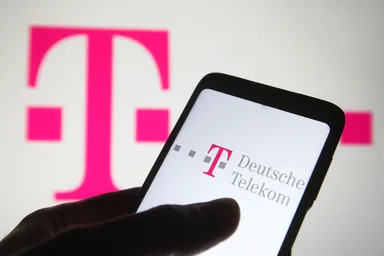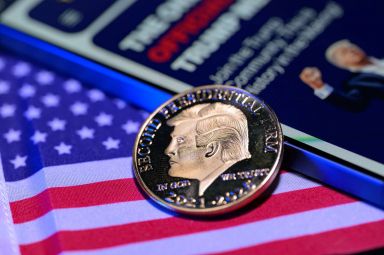Featured articles

DAX 40 continues to push to new highs
The DAX 40 sees six consecutive days of gains as the index pushes to new highs driven by risk-on sentiment
09:54, 12 January 2026

From Caracas to Wall Street: how the U.S.–Venezuela crisis could move markets
The start of the new year has marked a dramatic escalation in the United States’ confrontation with Venezuela.
08:53, 9 January 2026

Intel stock split: what it means for traders
Intel’s long history of stock splits reflects the company’s evolution through several major technology cycles, from early PC growth to data-centric expansion. With its most recent split taking place more than two decades ago, questions often arise about whether Intel may adjust its share structure again.
15:49, 19 December 2025

Vonovia stock forecast: Third-party price targets
Vonovia is a European residential real estate company listed in Frankfurt, with a large rental housing portfolio across Germany, Austria and Sweden. Explore third-party VNA price targets and technical analysis.
8 hours ago

SAP stock forecast: Third-party price targets
SAP is a Germany-listed enterprise software company providing business applications and cloud services to organisations worldwide, with its shares traded across multiple European and international markets. Explore third-party SAP price targets and technical analysis.
14:49, 10 February 2026

Diginex stock forecast: Third-party price targets
Diginex is a Nasdaq-listed regulatory technology company providing ESG data and sustainability reporting solutions, with shares trading amid notable price volatility and limited analyst coverage. Explore third-party DGNX price targets and technical analysis.
14:34, 10 February 2026

Deutsche Telekom stock forecast: Third-party price targets
Deutsche Telekom AG is a German-listed telecommunications group with operations across Europe and the US, providing mobile, fixed-line, broadband and digital services. Explore third-party DTE price targets and technical analysis.
14:18, 10 February 2026

Market Mondays: Volatility Dominates as Precious Metals Lead the Narrative
Markets trade with caution after the recent volatility as traders await the latest employment and inflation data from the US.
11:36, 9 February 2026

Markets enter a correction phase as volatility rises and geopolitical risks re-emerge
Markets selloff across the board as investors de-risk and balance their portfolios heading into the weekend
11:58, 30 January 2026

Week Ahead: Markets seek confirmation as policy, earnings and geopolitics converge
Central banks meetings, earnings and geopolitics in focus next week as markets test the soft-landing narrative
10:52, 23 January 2026

US100 forecast: Third-party targets
The US Tech 100 reflects the performance of some of the largest non-financial companies listed on the Nasdaq and is often used as a reference point for movements in the US technology sector.
16:11, 19 January 2026

Market Mondays: Volatility Dominates as Precious Metals Lead the Narrative
Markets trade with caution after the recent volatility as traders await the latest employment and inflation data from the US.
11:36, 9 February 2026

Are oil markets underestimating escalation risks between Iran and the US?
Oil markets have remained slightly subdued in recent weeks despite the rising tensions between the US and Iran.
12:13, 4 February 2026

Trading Silver’s 35% Pullback
Volatile technical overview has given conformist breakout strategies the clear edge as of late, while in sentiment it remains a majority buy story.
09:06, 2 February 2026

Markets enter a correction phase as volatility rises and geopolitical risks re-emerge
Markets selloff across the board as investors de-risk and balance their portfolios heading into the weekend
11:58, 30 January 2026

USD/JPY Under Pressure: dollar weakness meets yen intervention fears
Dollar weakness and intervention fears in Japan drive USD/JPY lower as key US data is to be released.
10 hours ago

Market Mondays: Volatility Dominates as Precious Metals Lead the Narrative
Markets trade with caution after the recent volatility as traders await the latest employment and inflation data from the US.
11:36, 9 February 2026

BoE Meeting Preview: Balance of inflation risks and growth concerns
The Bank of England faces a delicate balancing act between inflation risks and growth concerns.
10:45, 2 February 2026

ECB Meeting Preview: markets look beyond the decision to policy signals
The European Central Bank is expected to keep rates unchanged this week as focus centres on Lagarde's press conference
10:42, 2 February 2026

Dogecoin price prediction: Third-party outlook
Dogecoin (DOGE) is a cryptocurrency traded across global markets, with prices influenced by broader crypto conditions, liquidity and technical indicators. Explore third-party DOGE price targets and technical analysis.
13:17, 10 February 2026

Cardano price prediction: Third-party outlook
Cardano (ADA) is a blockchain-based cryptocurrency traded globally, with its price influenced by network developments, market sentiment, and wider conditions across the digital asset sector. Explore third-party ADA price targets and technical analysis.
13:10, 10 February 2026

TRON price prediction: Third-party outlook
TRON (TRX) is a cryptocurrency that runs on the TRON blockchain, a decentralised network focused on digital content distribution and blockchain-based applications. Explore third-party TRX price targets and technical analysis.
12:40, 10 February 2026

Trump coin price prediction: Third-party outlook
Trump coin (TRUMP) is a cryptocurrency token built on the Solana blockchain, launched in January 2025 and linked to President Donald Trump’s public profile and digital branding. Explore third-party TRUMP price targets and technical analysis.
17:09, 2 February 2026
